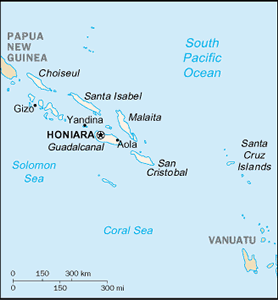The Geography of Solomon Islands
The Geography of Solomon Islands
Solomon Islander Geography
Location: Oceania, group of islands in the South Pacific Ocean, east of Papua New Guinea
Geographic coordinates: 8 00 S, 159 00 E
Map references: Oceania
Area: total: 28,450 sq km land: 27,540 sq km water: 910 sq km
Area - comparative: slightly smaller than Maryland
Land boundaries: 0 km
Coastline: 5,313 km
Maritime claims: measured from claimed archipelagic baselines territorial sea: 12 nm exclusive economic zone: 200 nm continental shelf: 200 nm
Climate: tropical monsoon; few extremes of temperature and weather
Terrain: mostly rugged mountains with some low coral atolls
Elevation extremes: lowest point: Pacific Ocean 0 m highest point: Mount Makarakomburu 2,447 m
Natural resources: fish, forests, gold, bauxite, phosphates, lead, zinc, nickel
Land use: arable land: 0.62% permanent crops: 2.04% other: 97.34% (2005)
Irrigated land: NA
Natural hazards: typhoons, but rarely destructive; geologically active region with frequent earthquakes, tremors, and volcanic activity; tsunamis
Environment - current issues: deforestation; soil erosion; many of the surrounding coral reefs are dead or dying
Environment - international agreements: party to: Biodiversity, Climate Change, Climate Change-Kyoto Protocol, Desertification, Environmental Modification, Law of the Sea, Marine Dumping, Marine Life Conservation, Ozone Layer Protection, Whaling signed, but not ratified: none of the selected agreements
Geography - note: strategic location on sea routes between the South Pacific Ocean, the Solomon Sea, and the Coral Sea; on 2 April 2007 an undersea earthquake measuring 8.1 on the Richter scale occurred 345 km WNW of the capital Honiara, the resulting tsunami devastated coastal areas of Western and Choiseul provinces with dozens of deaths and thousands dislocated; the provincial capital of Gizo was especially hard hit


